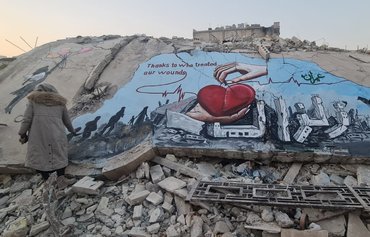With international sympathy for Syria running high following the devastating earthquake of February 6, Syrian president Bashar al-Assad has been attempting to shake off his pariah status at home and abroad.
During a Monday (February 13) meeting with United Nations (UN) relief chief Martin Griffiths, al-Assad "stressed the importance of international efforts focused on helping to rebuild infrastructure in Syria", the presidency said.
Yet his own government, which is under sanctions for its brutality, has been one of the biggest obstacles to the provision of vital international assistance to Syria.
Inside Syria, al-Assad is reviled, especially -- but not exclusively -- among those who have experienced bombardment by his Russian-backed forces.
![Syrians in Damascus provide aid items to be delivered to people affected by the earthquake in regime-controlled areas on February 8. [Sham FM]](/cnmi_am/images/2023/02/16/40704-earthquake-damascus-aid-600_384.jpg)
Syrians in Damascus provide aid items to be delivered to people affected by the earthquake in regime-controlled areas on February 8. [Sham FM]
![Two volunteers distribute food among earthquake survivors in Syria on February 7. [Syria Trust for Development]](/cnmi_am/images/2023/02/16/40705-earthquake-food-distribution-600_384.jpg)
Two volunteers distribute food among earthquake survivors in Syria on February 7. [Syria Trust for Development]
![Syrians who lost their homes in the earthquake shelter in tents provided by a humanitarian organisation on February 7. [Ataa Relief]](/cnmi_am/images/2023/02/16/40702-earthquake-temporary-tents-600_384.jpg)
Syrians who lost their homes in the earthquake shelter in tents provided by a humanitarian organisation on February 7. [Ataa Relief]
Outside Syria, he lacks legitimacy, with diplomatic ties to many countries severed as a consequence of his violent suppression of the Syrian people.
'Opportunity' for al-Assad
Al-Assad on Wednesday welcomed "any positive stance" from Arab nations, including many that severed ties with his regime amid the war, AFP reported.
His remarks came during a meeting with Jordanian Foreign Minister Ayman Safadi in Damascus, the second by a top Arab diplomat to Syria since the quake, following Emirati Foreign Minister Sheikh Abdullah bin Zayed Al Nahyan.
Jordan, which shares a border with Syria, is among the few Arab countries that maintained diplomatic ties with Damascus even after Syria's 2011 suspension from the Arab League.
Communications were however limited and official visits were halted for several years until June 2021, when a Syrian ministerial delegation visited Jordan.
On Sunday, the head of the World Health Organisation also met al-Assad and said the regime's leader had voiced openness to more border crossings for aid to be brought to quake victims in the opposition-held northwest.
On Tuesday, a Saudi plane carrying aid landed in Aleppo -- the first in more than a decade of war and severed diplomatic ties.
Al-Assad also received a call from Egyptian President Abdel Fattah al-Sisi offering support, their first official exchange since al-Sisi assumed office in 2014.
The ruler of Bahrain, which re-established diplomatic relations with Syria in 2018, called al-Assad in their first official conversation in more than a decade.
Analysts have viewed the momentum after the quake as an "opportunity" for al-Assad to return to the Arab fold as leaders have reached out to offer aid.
But many in Syria and the region urge caution.
Attempt to rehabilitate image
In an analysis Wednesday, the Washington Post noted that "natural sympathy for the Syrian plight may lead to a regime once ostracised by much of the international community coming out of the cold".
Al-Assad is "trying to rehabilitate his image by showing a willingness to make concessions through negotiations with international actors", Centre for Strategic and International Studies fellow Will Todman told the Washington Post.
"These concessions are minor, but his hope is that they will be enough to build a belief in European capitals and elsewhere that engaging with the regime is a productive way to improve conditions for Syrians in need," he said.
Despite the sanctions on Syria, AFP reported, regime-controlled parts of the country receive international aid through UN agencies, many of which have headquarters in Damascus.
There are concerns that al-Assad may seek to profit from or divert expanding aid flows into Syria, the Washington Post said.
Activists and emergency teams in Syria's northwest have decried the slow UN response to the quake in opposition-held areas, contrasting it with planeloads of humanitarian aid that have been delivered to regime-controlled airports.
Before the earthquake struck, almost all of the crucial humanitarian aid for the more than four million people living in opposition-controlled areas of northwest Syria was being delivered through just one crossing -- Bab al-Hawa.
UN Secretary-General Antonio Guterres on Monday announced that al-Assad has agreed to open two more border crossings from Turkey to northwest Syria to allow in aid.
"The human suffering from this epic natural disaster should not be made even worse by manmade obstacles -- access, funding, supplies," he said.
"Aid must get through from all sides, to all sides, through all routes -- without any restrictions."
Overwhelming chaos in Syria
In regime-controlled areas, "governmental agencies have expressly said they are incapable of providing any type of assistance", said Nevin Othman, a volunteer with a relief organisation in Damascus.
"All relief, search and rescue operations for those affected by the earthquake are done by citizens through civil society organisations and non-governmental relief agencies," she told Al-Mashareq.
Even the heavy equipment that is used to remove the rubble was provided by businessmen and construction contractors, she said, adding that these operations often stop midway because of fuel shortages.
Some governmental and semi-governmental relief teams were unable to provide assistance because they do not have the sufficient capabilities to do so, she said, adding that some have been collecting donations.
The scale of the catastrophe in Syria is rooted in the actions of the Syrian regime and its allies, Syrian lawyer Bashir al-Bassam told Al-Mashareq.
"All houses in Idlib and rural Aleppo have suffered damage," he said. "They have either wholly or partly collapsed or cracked, and the cracks make them susceptible to total collapse in case of a strong aftershock or air strikes."
He accused the regime of trying to benefit from the disaster and evade sanctions, by announcing that earthquake aid must go through affiliated agencies.
"In addition, the regime talked about destruction in the areas it controls only, although areas outside its control are hit the hardest by the earthquake," al-Bassam said.

![Civilians and volunteers search for survivors under the rubble in the Idlib province town of Basina on February 8. [White Helmets]](/cnmi_am/images/2023/02/16/40703-earthquake-idlib-rubble-600_384.jpg)






